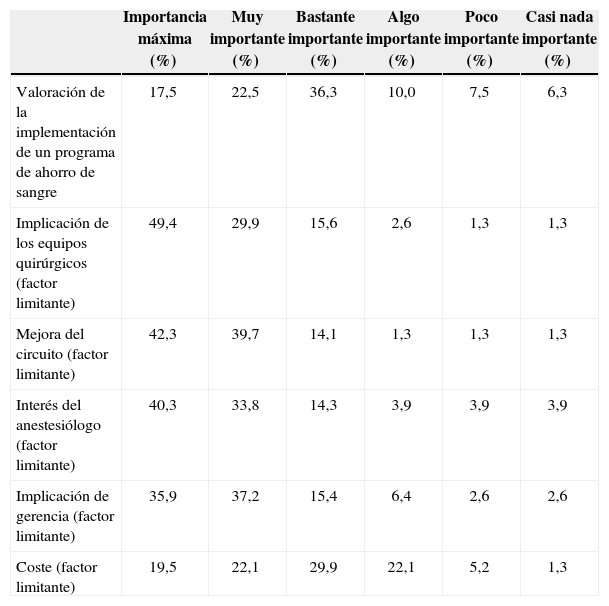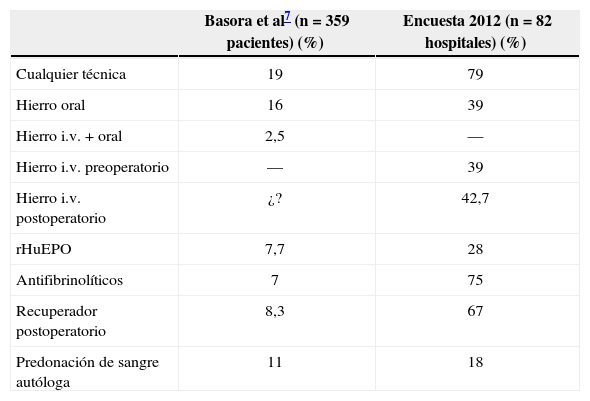El objetivo de este artículo es conocer la disponibilidad de un programa de gestión de la transfusión perioperatoria («Patient Blood Management») en distintos hospitales a través de una encuesta que incluía una descripción de la visita preanestésica, la disponibilidad y utilización de las diferentes técnicas de ahorro de sangre y los factores limitantes de su implementación para cirugía programada. La encuesta constaba de 42 preguntas dirigidas a servicios de anestesiología representativos de los hospitales del territorio español (n = 91), y se realizó durante los meses de septiembre a noviembre de 2012. Fueron analizadas las 82 encuestas que contestaron a todas las preguntas (90%). La consulta preoperatoria se realizó de forma habitual (> 70%) en el 87% de los hospitales. El tiempo desde la consulta hasta la cirugía osciló entre 1 semana y 3 meses en el 74% de pacientes programados para cirugía ortopédica y traumatológica, en el 78% de cirugía oncológica y en el 77% de cirugía cardíaca. Casi la totalidad de hospitales, 77 (94%), disponen de comité de transfusión, con presencia del anestesiólogo en el 90% de ellos. Se dispone de un programa de ahorro de sangre en el 79% de los hospitales y la técnica más frecuentemente utilizada es el uso de antifibrinolíticos en el 75% de los hospitales, seguida de la recuperación de sangre intra y postoperatoria en parecida proporción (67%). La optimización de la hemoglobina preoperatoria se realiza con hierro intravenoso de forma habitual en el 39% de los hospitales y con eritropoyetina recombinante en el 28%. La ausencia de un circuito bien establecido y la falta de implicación y colaboración con el equipo quirúrgico se presentan como los principales factores limitantes de la implantación del «Patient Blood Management». En la actualidad, su aplicación en España se puede considerar aceptable, pero podrían mejorarse aspectos, especialmente en el tratamiento de la anemia preoperatoria. La implementación del «Patient Blood Management» requiere colaboración multidisciplinar de todo el personal responsable de la atención perioperatoria, incluidas las autoridades sanitarias.
The objective of this article is to determine the availability of a perioperative transfusion management program (Patient Blood Management [PBM]) in various hospitals through a survey that included a description of the preanesthesia visit, the availability and use of the various blood-sparing techniques and the factors limiting their implementation in elective surgery. The survey included 42 questions, directed at the representative departments of anesthesiology of hospitals in Spain (n=91). The survey was conducted from September to November 2012. We analyzed the 82 surveys in which all the questions were answered (90%). Preoperative consultations are routinely performed (>70%) in 87% of the hospitals. The time from the consultation to surgery varied between 1 week and 2 months for 74% of the patients scheduled for orthopedic or trauma surgery, 78% of those scheduled for oncologic surgery and 77% of those scheduled for cardiac surgery. Almost all hospitals (77, 94%) had a transfusion committee, and 90% of them had an anesthesiologist on the committee. Seventy-nine percent of the hospitals had a blood-sparing program, and the most widely used technique was the use of antifibrinolytic agents (75% of hospitals), followed by intraoperative and postoperative blood recovery in equal proportions (67%). Optimization of preoperative hemoglobin was routinely performed with intravenous iron in 39% of the hospitals and with recombinant erythropoietin in 28% of the hospitals. The absence of a well-established circuit and the lack of involvement and collaboration with the surgical team were the main limiting factors in implementing PBM. Currently, the implementation of PBM in Spain could be considered acceptable, but it could also be improved, especially in the treatment of preoperative anemia. The implementation of PBM requires multidisciplinary collaboration among all personnel responsible for perioperative care, including the health authorities.
Artículo
Comprando el artículo el PDF del mismo podrá ser descargado
Precio 19,34 €
Comprar ahora













